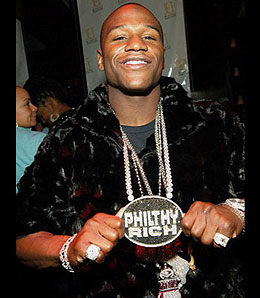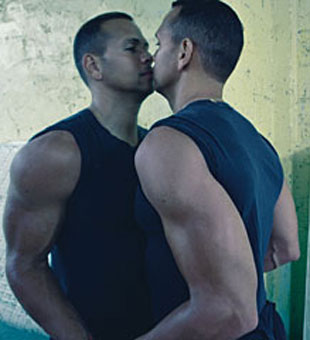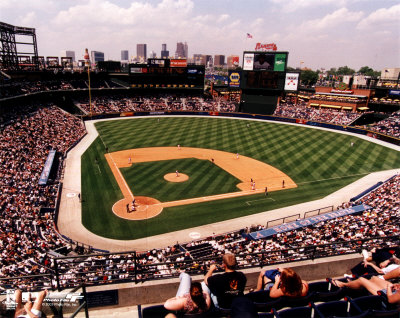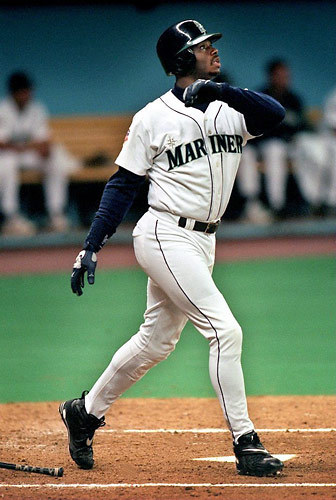A fond farewell to Ken Griffey Jr.
Last night was one of those perfect storms of sports news that happens every month or so.
Armando Galarraga’s perfect game was ruined on the 27th out by a controversial call by umpire Jim Joyce.
Game 3 of the Stanley Cup final went into overtime, with a goal being called back after the puck miraculously rolled across the crease. The no-goal was after National Hockey League Commissioner Gary Bettman got cantankerous with Ron MacLean during the second intermission of Hockey Night in Canada.
But what I’ll always remember about June 2nd 2010 is that Ken Griffey Jr. retired.
As I’ve written before, Griffey was my favourite baseball player growing up.
In his prime he was the best fielder and hitter in the game. In a time when professional athletes develop chips on their shoulders, become arrogant or act out, Griffey remained fun-loving and grounded.
His statistics speak for themselves. Griffey accumulated 630 home runs, the fifth-most in baseball history. He has 2781 hits, 1836 RBIs and a career batting average of .284. Hall of Fame numbers to be sure.
Griffey’s best season was undoubtedly 1997 when he won the American League MVP with the Seattle Mariners. That year he hit .304 while reaching career highs with 56 home runs and 147 RBIs.
As impressive as his numbers are, Griffey will always have the aura of unfulfilled potential. Not because he lacked effort, but because he never played in a World Series, even though his Seattle Mariners had a host of talent including Alex Rodriguez, Randy Johnson and Edgar Martinez.
Because he moved to the Cincinnati Reds, a team that has struggled throughout the 1990s and 2000s, he missed out on further playoff opportunities, including two more American League Championship appearances by Seattle in 2000 and 2001.
Nagging injuries forced Griffey to miss prime years of his career. Between 2002 and 2004 he hit a total 41 home runs while playing in only 206 games over those three seasons.
Although Griffey was great, arguably the best of an entire generation of ballplayers, it will always seem as though he might have had still had some untapped potential.
Despite those lost years, Griffey’s career represents an ideal trajectory that in a perfect world all athletes would follow.
Griffey was a genuinely good guy. Griffey knew he was going to be traded from Seattle in 2000, so he asked to be sent to his hometown Cincinnati Reds, the team his father played for in their Big Red Machine glory days. Given the opportunity to abandon the Reds in favour of a bigger salary with the New York Yankees, Griffey took a smaller contract to stay near his family.
He can also be judged for what he didn’t do. In an era where players like Mark McGwire are being held out of Baseball’s Hall of Fame for their connection to performance enhancing drugs, Griffey remains a first-ballot shoe-in because he’s never been connected to any kind of steroid use.
Although Griffey was a shadow of his former self in his final years with the Reds, Chicago White Sox and again with the Mariners, his legacy on and off the field is exemplary of what all baseball players could be – a role model off the field who actually produces incredible numbers.
Griffey will be missed as player, but he will always have a place in baseball.
Floyd Mayweather has the right idea
 Earlier today it was announced that boxing superstar and WBO champion Manny Pacquiao has agreed to WBC champion Floyd Mayweather’s demands and will submit to random drug screening as part of a deal to make a dream welterweight match happen.
Earlier today it was announced that boxing superstar and WBO champion Manny Pacquiao has agreed to WBC champion Floyd Mayweather’s demands and will submit to random drug screening as part of a deal to make a dream welterweight match happen.
“As long as they’re not getting a large amount of blood, I am willing to give out blood as close to two weeks before the fight,” Pacquiao told the Bulletin late Wednesday night.
This is the second time the two pugilists have agreed to fight; their first encounter was cancelled when Pacquiao refused to be tested for performance enhancing drugs, a procedure that Mayweather insists that he and all of his opponents go through.
Whoever wins this match will be considered the best pound-for-pound boxer in the world. It promises to be an exciting pairing, one that fans of the sweet science have been clamouring for for years.
Some corners feel that this was simply an excuse for Mayweather to duck the seemingly superior Pacquiao. That the drug tests are a stalling tactic by Mayweather to protect his perfect record.
I’m not sure that this is the case. I hope not, because I think that Mayweather has the right idea.
With so many athletes in so many sports testing positive for steroids, human growth hormone or even recreational drugs, many fans are becoming increasingly cynical. Steroid scandals have dealt body blows to the reputations of baseball, cycling and the Olympics.
By voluntarily submitting blood samples to the United States Anti-Doping Agency Mayweather is not just protecting his legacy, but improving the tarnished image of sports.
It’s a breath of fresh air, and particularly refreshing given the sorry state that boxing is in. The sweet science is losing ground to mixed martial arts by the day. This is a sport that has too many titles, too many flashes in the pan.
But Mayweather’s aggressive pro-testing stance means that boxing’s dwindling number of fans, whether they like him or not, at least know that there is some integrity whenever he steps in the ring.
Personally, if I were a professional athlete in any other sport I would be doing the same thing. By getting voluntarily tested on a monthly basis for the duration of my career, there would be no doubt about the veracity of my records.
This is especially topical since disgraced Tour de France winner Floyd Landis revealed to his sponsors today that he has been doping since 2002.
If I were another professional cyclist I would want to guarantee that everyone knew that I was clean, no matter how well I did. A sure-fire way to do that would be to hold myself to an even higher standard than that of by sports’ governing body.
Although the North American legal system relies on burden of proof – that everyone is innocent until proven guilty – this isn’t about laws. This is about regaining the public’s trust and establishing a reputation of integrity. In that respect, Floyd Mayweather is doing the right thing.
You’re bringing me down, ARod

This photo of Alex Rodriguez has nothing to do with Thursday's game against the Oakland Athletics. It's just funny.
Yesterday I tried to be sunny and say three nice things about Major League Baseball. It took less than 24 hours for Alex Rodriguez to bring me back down with his bush league play.
In case you missed it, Yahoo Sports’ Big League Stew summed it up well:
“In the sixth inning of the A's 4-2 victory, Rodriguez went from first to third on a foul ball by Robinson Cano. His trip back to first took him right over the pitcher's mound, an unspoken no-no that ticked [starting pitcher Dallas] Braden off right away.
After a double play ended the inning, the 26-year-old pitcher immediately started yelling at A-Rod — watch it here — who claimed he didn't know he had done anything wrong.”
This isn’t the first time that ARod has broken one of baseball’s unwritten codes. We’ll ignore his admitted steroid use and focus on his transgressions against the game’s etiquette.
My first exposure to Rodriguez’s classless brand of play was during the infamous 2004 American League Championship Series with his New York Yankees leading the series against the Boston Red Sox 3-0. On a routine groundout to the pitcher ARod decided to chop the ball out of Bronson Arroyo’s hand. After some deliberation the umpires ruled him out.
It became a turning point in the series with the Red Sox rallying to an improbable seven-game series victory.
Three seasons later, Rodriguez got into the same kind of shenanigans at Toronto’s Rogers Centre. During an infield fly Rodriguez, circling rounding third, yelled right behind the rookie infielder who had called for the ball. Believing that he was being called off by another Blue Jay, the fielder let the ball fall harmlessly to the ground, allowing the Yankees to score.
Asked about the incident, ARod claimed that he had only yelled in celebration.
My problem with ARod isn’t so much what he does, but how he handles the ensuing criticism. He refuses to accept responsibility.
I don’t mind there being a heel in baseball. In fact, I think it’s one of the best things about Barry Bonds’ entire career. I didn’t like the former Giants slugger, but I could at least admire his willingness to be the villain.
Instead, of Bonds’ unique sense of personal responsibility, we get Rodriguez saying this in reaction to Braden’s blow-up: “He just told me to get off his mound. I was a little surprised. I'd never quite heard that. Especially from a guy that has a handful of wins in his career ... I thought it was pretty funny actually.”
I see ARod’s flaunting of baseball’s social conventions as something akin to taking a run at a goaltender in hockey or flagrantly fouling a star player in basketball. You can do it, but don’t act surprised when they’re upset.
Don’t dismiss their complaints because you have a higher batting average or get more lucrative endorsement deals. Appreciate that if you lack respect for your opponents they’re going to disrespect you. Expect some sort of retribution and take your lumps.
Let’s try a little positivity…

One of the things I love about baseball is the relaxing atmosphere of afternoon games, particularly when broadcast from Turner Field on Peachtree TV.
I’m reading Sports Illustrated’s Great Baseball Writing and I’ve learned something from the various essays and articles in the volume – the great American pastime is always in a state of hand-wringing about the State of the Game.
Think about it. At the turn of the 20th century there was great concern over the hoodlums who played the game. The 20s were marred by gambling scandals, primarily the one revolving around the Chicago White Sox and the 1919 World Series. After that was World War II, segregation, integration, labour strife and, most recently, steroids.
There’s always a new problem plaguing the sport.
In all that doom and gloom there isn’t enough talk about what makes baseball great. I’m as guilty of this pessimism as the next person. This season alone I’ve taken shots at my hometown Toronto Blue Jays, complained about lengthy games and weighed-in on Joe Cowley and talk of moving the Jays.
So let’s get positive. Let’s talk about three things that I love about baseball.
1) Afternoon Games
Nobody likes to work during the summer. It’s a drag. Everyone would much rather be outside, enjoying the sun. Unfortunately, employment is a necessary element of being a part of today’s society.
However, baseball matinees can provide some respite from the drudgery of work. Following the game on the radio, on TV or on the Internet is always a pleasant distraction from a job.
A particular favourite of mine is to follow the Atlanta Braves on Peachtree. Their announcers are laid back and the fans at Turner Field are great. It’s always relaxing and fun to watch.
2) Tradition
I really enjoy the little social behaviours that surround baseball games. Waiting for the half inning to return to your seat after a trip to the concession stand. Judging a person’s character based on whether or not they use the real pitcher’s rubber during the opening pitch. Singing, stretching and dancing during the seventh inning stretch. They’re all good.
A particular favourite is the habit of Torontonians to boo any opposing team that dares to have a mound meeting or try to pick-off a runner. No matter what the situation, Jays fans go nuts at the very thought of another team trying to invoke strategy.
3) The Fans
Baseball fans can’t compete with other sports’ supporters in terms of passion or intensity, but they are definitely smarter. Hockey fans, as much as I love ‘em, are basically only capable of three sounds – boo, cheer and Go <team name> Go! The rest of the game is spent in a fixed state of concentration. Football and basketball fans are much the same.
However, baseball fans sing songs together, come up with chants, and best of all heckle. No matter where they’re sitting in a stadium they will yell at the top of their lungs lengthy diatribes on their target’s short-comings as a player.
Their knowledge of bench players and opposing teams runs deep too, with many fans citing the personal lives of the athlete. Remember when it was rumoured that Alex Rodrgiuez was stepping out on his wife with Madonna? Good times. Truly, a golden age of heckling.
